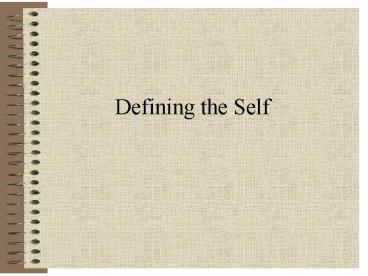Defining the Self PowerPoint PPT Presentation
1 / 19
Title: Defining the Self
1
Defining the Self
2
The I and the ME of the SELF
- I
- differentiates us from other objects
- understand control and volitional functions
- sense of continuity
- self as actor
- ME
- influences information processing/interpretation
- guides immediate behaviors
- motivation
- self as object
3
Jamess taxonomy of selves
- I
- ME
Empirical Self various ways people think about
themselves
Material Self
Social Self
Spiritual Self
4
Making Jamess selves work
- How do these aspects of self factor into your
everyday lives -- what do they explain? - Material self -- pack-rats, heirlooms
- Social self -- having your worlds collide
- Spiritual self -- depressed despite success
- How do these classifications fit your lists?
5
Self beyond James
- Implicit categorizations of your lists
- How many dimensions are there?
- Cross-cultural research suggests ?
- 1.
- 2.
- 3.
- 4.
- 5.
- 6.
6
Multidimensional Self
- Self- concept --
Self representations --
7
Managing Multiple selves
- Can your self representations be discrepant?
- Which self will you be today / now?
- Working self-concept --
8
To clarify the topic of discussion (thus far)
- Self-concept -- how you about yourself
- Self-esteem -- how you about yourself
9
Self-esteem models
- Competing theories of how global estimates are
derived by individuals - Bottom-up
- Top-down
10
What to make of this stuff
- Think about your self-representations
- What self representations do you have?
- How do you define these selves?
- How do your self-views change with different
environments? - Where /How do you develop these different self
representations? - How do these different self representations
affect your life?
11
Developing the Self
12
Influences on the Self
SELF
- How important is each influence?
- What implications does this view of SELF
development have in the real world?
13
Cultural Influences
- Does our culture reflect who We are? OR do We
reflect what our culture is?
EXAMPLE
14
Cultural development of Self
- Independent self --
- world view
- Interdependent self --
- world view
15
In what culture has your self developed?
- 1. What percentage of American children live
with both biological parents? - a. 21 b. 44 c. 60 d.
83 - 2. What percent of the US population dies each
year? - a. 1 b. 5 c. 10 d. 24
- 3. What is the homicide rate in America per
100,000 population? - a. 11 b. 21 c. 42 d.
61 - 4. What percentage of births are to unmarried
women in US? - a. 10 b. 20 c. 30 d.
40 - 5. What percentage of the US population is
Latino? - a. 2 b. 8 c. 16 d.
24
16
What I think others think Reflected Appraisals
- Looking-glass self -- we see ourselves in how
we are seen by others (Cooley, 1902) - How we think others perceive us, not necessarily
how they see us (Mead, 1934) - Consistent with idea that perception is reality
--- allows for individual differences in self
development maintenance
17
You are who you arent Influence of others
- Social identity -- .
- Self is defined by
- Implies that for every us there is a them
- Developed through
- Suggests that your views of self are constantly
changing depending on
18
An open book? Self-perception
- Self-perception theory --
- theory is intended to address attitude change
- specific to particular attitudes and behaviors
- Limited to situations of ambiguity
- Generalizing it to development of SELF
19
Do you Know thyself?
- What is the usefulness of knowing the SELF?
- Can you know the the SELF?
- How can you get information on the SELF?
- How reliable is this type of data?
- How worthwhile is this concept unless
definitive answers can be found?

